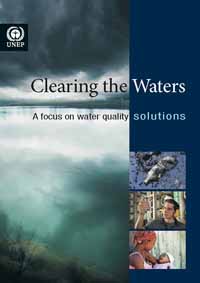Clearing the Waters: A Focus on Water Quality Solutions

Clearing the Waters: A Focus on Water Quality Solutions
Every day, 2 million tons of sewage and industrial and agricultural waste are poured into the world’s waters. The result is that more people die from unsafe water annually than from all forms of violence, including war. A new Pacific Institute report released by the United Nations Environment Programme (UNEP) for World Water Day, March 22, 2010, lays out steps and solutions to address our urgent water-quality challenges––and they start with awareness and will to action. “A wide range of human activities affect water quality. The health of our ecosystems––and our communities––depends on how we act now,” said Achim Steiner, executive director of UNEP. “Improving and protecting water quality means healthier ecosystems, improved human well-being, and more secure livelihoods, both for ourselves and for future generations.” The new United Nations report, Clearing the Waters: A Focus on Water Quality Solutions, details how water quality is as important as water quantity for satisfying human and environmental needs, yet has received far less investment, scientific support, and public attention. Prepared by the Pacific Institute, one of the world’s leading nonprofit research organizations on freshwater issues, the UNEP report is part of the World Water Day 2010 effort to bring global attention to the need for clean, safe water––and action and policy to address water pollution. “Improving water quality, whether by preventing pollution, treating wastewater before disposal, or restoring the quality of waterways, requires increased awareness and political will,” said Peter Gleick, president of the Pacific Institute. “The consequences of inaction are stark: water-quality problems affect our health, reduce agricultural productivity, impose additional costs on industrial production, and degrade ecosystem services––with costs to local populations and governments.” Clearing the Waters calls for worldwide action to:
Overview
-increase awareness to change individual behavior around what we put into our water;
-promote policies that improve water quality with education and advocacy;
-increase enforcement of the regulations put in place to protect water quality;
-put investor and consumer pressure on corporations and that pollute waterways.Resources

